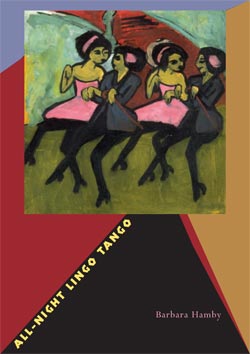The Hollins Critic, February 2011, pp. 18-19.
"There are not too many places in which Olive Oyl, Lois Lane, and Betty Boop converse freely with Queen Mab, Nietzsche, Yorick’s skull, snot-nosed six year old boys, the devil, Harold Pinter, and Sir John Falstaff, EMT. In All-Night Lingo Tango, Barbara Hamby not only makes it happen, but executes this ambitious project with style. All of Hamby’s speakers sing her poems loudly, directly at, but also with, the reader to the infectious tune of a self-aware, well-read, and contemplative hipster sound off.
Hamby’s collection combines an intense love affair with language and a consideration of life. It has been said that her work is “like an opera by Donizetti with lyrics by Groucho Marx—lush, musical, brainy, and full of fun!” This is a perfect description of the juxtaposition of irreverence, play, rhythm, and contemplation that marks the work. Yet, it does not indicate the more serious issues that course throughout the book, beginning and ending with a speaker who is, presumably, close to the author herself, and breaking in the middle with “Lingo Sonnets” that speak of similar issues from the point of view of various fictional characters. We cannot forget Hamby’s earlier comments regarding war when Raskolnikov concludes his rant in favor of Shakespeare’s bloody leaders: “Give me a tyrant any day—Saddam, Nebuchadnezzar . . . O / pop a cork for Babylonia—now, I believe, called Iraq.”
Throughout the collection, Hamby has enormous fun with the English language, which she says is the book’s “primary god.” The beats of the tango indicated in her title course throughout the text with a rhythm that is a strong component of the collection’s voice. In “Ode on Laundry, Lester Young, and Your Last Letter,” for example, we can hear the musician’s “whispering sax embarrass / the afternoon with its lax hold on each note, letting / one go then pulling it back into his bell, strutting / bit, Mr. Cock-a-doodle-do” the words enveloping the reader, just as the music has the speaker. “Ode to Little Boys” sings Hamby’s marveling praises of the “gorgeous malapropisms” of young children, such as “fwasty for thirsty,” which convey more meaning than the original adult terms.
The collection can be abstruse at times, but those of us who are not a well-read as Hamby need not feel too overwhelmed and afraid to give the book a shot. Catching every reference is undoubtedly delightful, but not a must for successfully enjoying the poems in this collection. It’s true: readers who have chosen to spend romantic evenings with John Keats, Oscar Wilde, and Allen Ginsberg as opposed to “chatting up bores” will be delighted to hear Olive Oyl consider quantum mechanics while Nietzsche desperately attempts to explain to Lois Lane that the Ubermensch does not have nerves of steel. However, All-Night Lingo Tango is not simply a haven for eggheads who wish to boost their self-esteem by recognizing references to Shakespeare and Superman. These characters are only part of a book with much broader considerations. Anyone who has contemplated fear; had a comment to make about war or religion; is passionate about cake; enjoys music, words, and sound; and keeps plugging along at life as best as possible, with a brilliant vitality, is a peer of Hamby’s and will laugh, think, and tap toes in rhythm to her book." —Suzanne Halka

